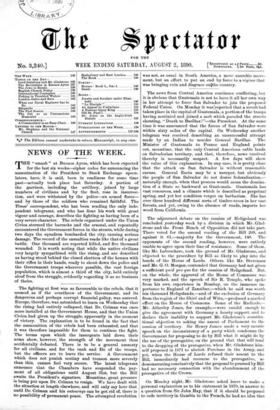The adjourned debate on the cession of Heligoland was concluded
yesterday week by a division in which Mr. Glad- stone and the Front Bench of Opposition did not take part. There voted for the second reading of the Bill 209, and against it 61,—majority for the Government, 148. The opponents of the second reading, however, were entirely unable to agree upon their line of resistance. Some of them, like Mr. Labouchere, took the ground of Mr. Gladstone, and objected to the procedure by Bill as likely to play into the hands of the House of Lords. Others, like Mr. Stevenson and Mr. G. O. Morgan, contended that Germany had not given a sufficient quid pro quo for the cession of Heligoland. But, on the whole, the approval of the House of Commons was very marked, and the speech of Sir R. Temple, who spoke from his own experience in Bombay, on the immense im- portance to England of Zanzibar,—which he said was worth ten thousand Heligolands,—and of the exclusion of Germany from the region of the Shire and of Witu,—produced a marked effect on the House of Commons. Some of the Radicals,— Mr. .A.therley Jones, for example,—were candid enough to give the agreement with Germany a hearty support, and to declare their inability to support Mr. Gladstone's constitu- tional objection to asking the assent of Parliament to the cession of territory. Sir Henry James made a very caustic speech on the inconsistency of a party which condemns the Government for proposing to do by Bill what it might do by the use of the prerogative, on the ground that that will tend to the dropping of the prerogative, when Mr. Gladstone him- self proposed in 1871 to abolish Purchase in the Army, and yet, when the House of Lords refused their assent to the Bill, immediately had recourse to the prerogative, so demonstrating conclusively that the proposal to proceed by Bill had no necessary connection with the abandonment of the prerogative of the Crown.


































